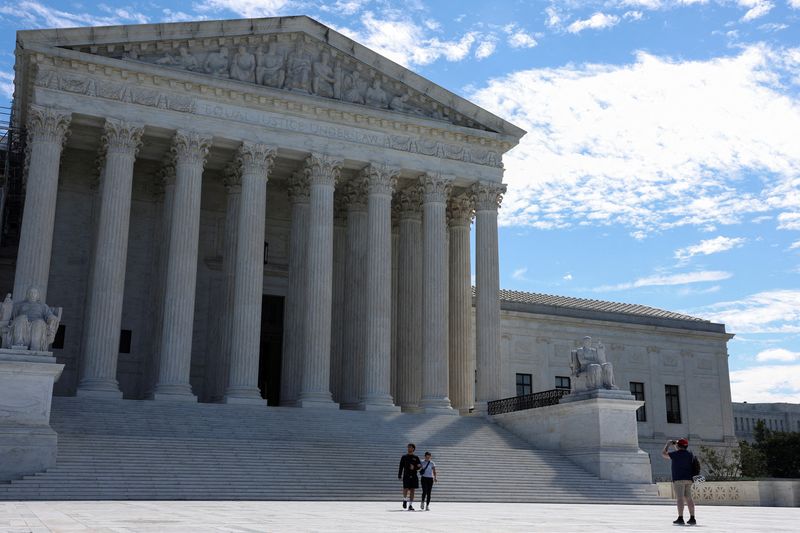By Nate Raymond
(Reuters) -The U.S. Supreme Court declined on Monday to hear a bid backed by a conservative Christian legal group to challenge a Maryland school district's policy against informing parents if their children identify as transgender or gender nonconforming.
The justices turned away an appeal by three parents with children attending public schools in the Washington suburb of Montgomery County of a lower court's ruling holding that they lacked the necessary legal standing to challenge the policy. The plaintiffs are represented by the Virginia-based National Legal Foundation.
The issue of transgender rights has become a flashpoint in the U.S. culture wars. As part of this, conservative litigants and parents groups have filed lawsuits in various U.S. jurisdictions challenging school policies that seek to respect requests by transgender students to not "out" them to their parents without their consent.
The policy at issue, adopted by the Montgomery County Board of Education for the 2020-2021 school year, permitted schools to develop gender support plans for students to ensure they "feel comfortable expressing their gender identity."
The policy directs school personnel to help transgender and gender nonconforming students create a plan that addresses their preferred pronouns, names and bathrooms, and bars staff from informing parents of those plans without a student's consent.
Frederick Claybrook, a lawyer for the Maryland plaintiffs, called the Supreme Court's decision not to hear their appeal disappointing, noting that policies like the ones at issue in this case have been adopted by various schools across the country.
"We look forward to when the Supreme Court will confirm that such policies violate the rights of parents, the ones who best know their children and their needs," Claybrook said.
A lawyer for the Montgomery County Board of Education did not immediately respond to a request for comment.
The plaintiffs - one mother and two fathers - sued in 2020, arguing that the district's policy violated their due process rights under the U.S. Constitution's 14th Amendment to direct the care of their children.
U.S. District Judge Paul Grimm tossed the case in 2022, and a three-judge panel of the Richmond, Virginia-based 4th U.S. Circuit Court of Appeals upheld the dismissal on a 2-1 vote in 2023, finding that while parents raised "compelling" arguments, they lacked standing to pursue their claims.
Judge A. Marvin Quattlebaum, writing for the 4th Circuit majority, cited the lack of allegations that the children of these parents are transgender, or have any gender identity issues or "gender support plans" that addressed, among other things, what names, pronouns and bathrooms they would use.
Quattlebaum, an appointee of Republican former President Donald Trump, said that meant the plaintiffs had failed to put forward facts showing the schools had any information about their children that might be withheld from them.
That flaw rendered their opposition a mere "policy disagreement," Quattlebaum said.
"And policy disagreements should be addressed to elected policymakers at the ballot box, not to unelected judges in the courthouse," Quattlebaum wrote.
The school district has said its policy was intended to ensure that its schools provide a safe and welcoming environment where all students feel accepted. While the policy encourages parental involvement whenever possible, the district said, it reflected the reality that in some cases students may not openly express their gender identity at home out of concern for their safety or acceptance.

The plaintiffs, in appealing, had argued that the 4th Circuit's ruling misread U.S. Supreme Court precedent on legal standing and conflicted with decisions by other federal appeals courts. The parents also had urged the justices to not just decide whether they had standing to sue but determine whether the school policy violated their fundamental parental rights.
"Moreover, this case presents an issue on the merits that is roiling parents and school districts from Maine to California," they wrote in their petition to the justices. "It is important for parents, their children and public schools alike to have this issue addressed and resolved now."